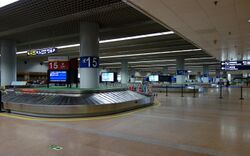Philosophy:Non-place
Non-place or nonplace is a neologism coined by the France anthropologist Marc Augé to refer to anthropological spaces of transience where human beings remain anonymous, and that do not hold enough significance to be regarded as "places" in their anthropological definition. Examples of non-places would be motorways, hotel rooms, airports and shopping malls. The term was introduced by Marc Augé in his work Non-places: introduction to an anthropology of supermodernity.[1]
The perception of a space like a non-place is strictly subjective: any given individual can view any given location as a non-place, or as a crossroads of human relations. For instance, a shopping mall is not a non-place for a person who works there every day.
The concept of non-place is opposed, according to Augé, to the notion of "anthropological place". The place offers people a space that empowers their identity, where they can meet other people with whom they share social references. The non-places, on the contrary, are not meeting spaces and do not build common references to a group. Finally, a non-place is a place we do not live in, in which the individual remains anonymous and lonely. Augé avoids making value judgments on non-places and looks at them from the perspective of an ethnologist who has a new field of studies to explore.
With regard to the classification of shopping malls as non-places, more recently an Italian researcher from the University of Bergamo, Marco Lazzari, developed a survey on a large sample of adolescents, and showed that the mall is a place where teens do not meet by chance, nor with the sole purpose to buy something, but to socialize, meet friends and have fun. Whereas shopping malls are (at least in Italy) yet prejudicially regarded by adults as non-places, they seem to be natively concerned with the identity of the so-called digital natives.[2]
Mark Fisher's notion of non-time
For Mark Fisher, whereas cyberspace-time tends towards the generation of cultural moments that are interchangeable, hauntology involves the staining of particular places with time: a time that is out of joint. A “flattening sense of time” appears to Fisher as a byproduct of Augé's non-places, which by being absent of local flavour[3] are indeterminate temporally as well as locally. He describes music created decades in the past as deprived of any sense of disjuncture with the present,[4] a clear connection with his theory of capitalist realism.
See also
- Sense of place
- Liminality
- :de:Das Ende der Welt
- :de:Nicht-Ort
- Cybernetics
References
- ↑ Marc Augé, Non-places: introduction to an anthropology of supermodernity, Le Seuil, 1992, Verso, p. 122.
- ↑ Marco Lazzari, The role of social networking services to shape the double virtual citizenship of young immigrants in Italy, Proceedings of the IADIS International Conference on ICT, Society and Human Beings 2012, Lisbon, Portugal, July 21–23, 2012.
- ↑ Mark., Fisher (2014). Ghosts of my life writings on depression, hauntology and lost futures.. Zero books. ISBN 978-1-78099-226-6. OCLC 936416159. http://worldcat.org/oclc/936416159.
- ↑ "Past and Present in "Strange Simultaneity": Mark Fisher Explains Hauntology at NYU" (in en). http://rhizome.org/editorial/2011/may/18/hauntology/.


